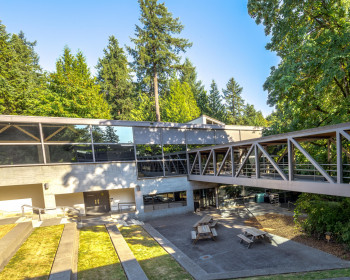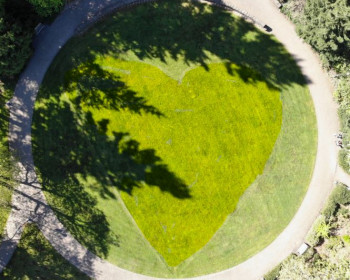Prof. Dan Rohlf reflects on sustainability issues during his spring sabbatical
Open gallery

Ikaria is an island in the eastern Aegean Sea. One of its key distinguishing features is its lack of significant human development relative to other Greek islands. Ikarians’ lifestyle is not too different than the way people have lived for thousands of years; perhaps as a result, this island is recognized as a so-called “blue zone” where it is common for people to live 100 years or more. [Side note: Most people on Ikaria eat a lot of organic produce that they grow themselves. They live a long time. Perhaps a connection there?] While tourists in the summer more than double the island’s 7,500 residents, relative to other Greek islands there is much less tourism and associated infrastructure, which has helped protect Ikaria’s excellent habitat for other species as well as people. Much of the island is protected under the European Union’s Natura 2000 program. The island is also designated as an Important Bird Area in Greece. It provides excellent habitat for several species of raptors and is an important migratory corridor for many birds.
Due to their isolation, energy is always a significant issue for islands’ human communities, and Ikaria is no exception. While there are two large solar photovoltaic arrays on the island, Ikaria’s residents currently get most of their electric power from a smoky diesel generator near the main town. However, construction is underway on a renewable energy project that would – if completed as originally envisioned – meet all of the island’s electricity demand for most of the year and nearly three quarters of the load during the busier summer months. But most Ikarians, as well as many environmentalists, oppose the project, setting up a clash similar to controversies that have increasingly arisen over proposed renewable energy projects in the United States as well.
Ikaria provides the perfect setting for a renewable energy project that would be unique in Europe – a complex creating wind-generated electricity that can be stored so it is available whenever people need it whether the wind is blowing or not. The island’s geography provides the perfect ingredients for this dream scenario: wind, elevation, and water. Huge wind turbines on the peaks and ridges that makes up Ikaria’s backbone will generate significant electricity, much of which will power pumps to lift water into reservoirs high in the mountains. Managers can then release water from the reservoirs to flow back down the steep slopes through hydroelectric turbines, timing those releases as needed to perfectly meet demand for power. In essence, creating potential energy by lifting and storing water above hydroelectric turbines acts as a battery for storing wind power.
Here’s the catch: almost no one we spoke to on Ikaria wants the project to be completed.
Most people object to the energy project as simply too disruptive of their natural scenery and low-key island. Ikaria currently has few major roads – and “major” on Ikaria just means paved. Construction of the wind turbines needed to complete the project would entail building extensive new roads large enough to transport, operate, and service the huge turbines. The project would also significantly alter the profile of the rugged and rocky peaks jutting out of the Aegean Sea that form the island itself. Finally – though interestingly not a factor often mentioned by most island residents – the turbines would also kill birds and bats that live on Ikaria or use the island as a migratory stop.
So Ikaria provides an opportunity to think about the tradeoffs inherent even in producing renewable energy. Residents of the island are some of the longest-lived people on earth, perhaps in part because the modern world has largely bypassed Ikaria. On its windswept peaks, there are only rocks and goats – exactly what Homer would have seen there at the time he wrote about the mythical Icarus flying too close to the sun and plunging into the sea where the island now rises above the waves. Few island residents want to look each day at a huge industrial wind complex along Ikaria’s ancient spine.
On the other hand, Ikarians obviously enjoy the benefits of electricity, which now comes from imported fossil fuels firing the island’s generation station and belching greenhouse gases and other pollution into the fiercely blue Aegean sky. Should aesthetic tastes and impacts to birds and bats stand in the way of an innovative and sustainable source of power that could meet almost all of the island’s needs?
While ancient philosophers never could have anticipated Ikaria’s twenty-first century dilemma, this question offers no easier answers than those considered by thinkers thousands of years ago. Perhaps our descendants will someday study the implications of the path we chose.
More Environmental, Natural Resources, & Energy Law Stories
Environmental, Natural Resources, and Energy Law is located in Wood Hall on the Law Campus.
MSC: 51
email elaw@lclark.edu
voice 503-768-6649
Environmental, Natural Resources, and Energy Law
Lewis & Clark Law School
10101 S. Terwilliger Boulevard MSC 51
Portland OR 97219

